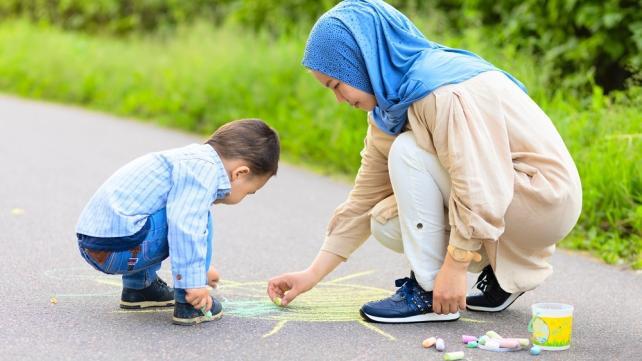As the final days of the school year approach, a sense of anticipation fills the air for children and parents alike. Hearts brim with excitement at the thought of finally putting away those textbooks in honor of the arrival of summer holidays and the prospects of some adventure and relaxation.
Amidst the thrill of the upcoming summer fun, there is also a realization of the significance to establish a structured summer schedule for kids. This recognition is particularly felt by parents, who understand the value of maintaining a balance between leisure and continued growth for their children. And so, to ensure that their time off is not only enjoyable but also productive and enriching.
Working up a Summer Routine
Before plunging into the task of developing a summer routine for your children, it’s crucial to recognize that the essence of enjoying summer break lies in avoiding over-scheduling. So there has to be a delicate balance between planned activities, exciting outings, and precious downtime. That said, maintaining a flexible daily routine also means that you essentially incorporate a core structure. This will help to provide a sense of predictability, reduce anxiety, and enable efficient time management for planning events and activities throughout the day. For instance, by establishing consistent wake-up and bedtime routines, as well as designated meal times, parents can help their children maintain stability during the summer break. Simultaneously, this structure also allows for the seamless integration of scheduled events and other outings. Bearing this in mind, here are some practical tips to help you achieve that goal.
Involve the children.
Engaging the kids in the planning process is critical when developing a summer routine. After all, without their involvement, the whole exercise may seem rather pointless, unless, of course, your child is still a baby. So, sit down with your kids, discuss their preferences and any specific activities or outings they would like to participate in as this will help tailor the schedule to their interests as well as offer a sense of dominion.
Plan a mix of activities.
Including a range of activities is always a good idea, especially when you have more than one child, as it ensures that various interests and needs are met. Moreover, it provides the flexibility of having additional options to choose from, even if you are unable to accomplish everything that you had initially planned.
Children need to have the flexibility to create a harmonious balance in their days. Therefore, incorporating a combination of structured and unstructured activities can prove to be highly effective. Structured activities provide guidance and learning opportunities, while unstructured time allows them the freedom to explore their own passions and interests without the need for constant supervision. And, together this balance helps to foster independence, creativity, and self-discovery, bringing about a sense of fulfillment.
Make room for downtime.
In addition to unstructured activities, it is crucial to include downtime to allow children to recharge and relax. While unstructured time gives them the freedom to pursue their own interests which may include reading books, engaging in imaginative play, or doing puzzles, being able to unwind is important, too. For this purpose, it is best to avoid over-scheduling, to prevent burnout and ensure a healthy balance between activities and relaxation.
Be flexible.
Having a routine is important, but it’s equally essential to allow for flexibility, adaptability, and spontaneity. For example, allowing for changes based on weather, unexpected opportunities (such as spontaneous plans with family and friends), or even the child’s evolving interests! Being flexible allows for a sense of adventure and makes the experiences more meaningful and enjoyable for everyone.
Creating Learning Opportunities
When planning for long summer days ahead, the possibilities may be endless, especially when your kids are involved. However, as parents, you want to avoid breaking the bank and be as practical as you can. With that in mind, I’ve managed to put together a delightful collection of engaging ideas that I’m excited to explore with my children this summer.
1. Set up a library.
Nurturing a love for reading in children is a shared desire among most parents, and for good reason! During the summer season when we generally aim to prevent any learning setbacks, reading can serve as a remarkable avenue to spark imagination, expand knowledge, cultivate empathy, and foster a lifelong love for learning in our kids.
This summer, I have an exciting plan to nurture the love for reading in a unique way. My idea is to let the kids set up a mini library right in our own home, where they can create a warm and inviting space filled with books. To make it even more special, I will encourage my kids to invite their friends over to visit and borrow or exchange books. This initiative will not only encourage reading but also promote social interaction, sharing, and the joy of discovering new stories together. And, best of all it will offer a wonderful opportunity for children to cultivate their love for reading while building meaningful connections and lasting memories centered around the magic of books!
2. Learn the Language of the Quran.
Engaging our children in learning the language of the Quran can be a transformative experience for it can allow them to deepen their connection with the word of Allah. Plus, it can serve as a great opportunity to meaningfully incorporate reading the book of Allah into the summer schedule, too. There are a number of engaging platforms for kids and parents to choose from. Some of these include:
Karazah Channel teaches kids the fundamentals of the Arabic language in an appealing and scientific way. The fundamentals and methods of the content have been developed by a team specializing in education and children’s media from five countries around the world – USA, France, Turkey, United Arab Emirates, and Qatar.
Quran for Kids is an online platform that offers free Quran learning resources specifically designed for children. It includes interactive lessons, memorization tools, and engaging activities to help kids learn and recite the Quran with proper pronunciation.
Quran Progress: Learn Arabic through Quranic vocabulary via this interactive Anderoid app.
3. Go on a virtual trip.
Many museums, zoos, and landmarks now offer the exciting opportunity to do virtual tours. This can serve as an excellent means for family bonding time as well as allow children to explore and learn about different places and cultures from the safety and comfort of our homes.
A List of Free Virtual Tours : From getting access to free Museum tours to exploring the NASA Houston Space Center, thrilling theme parks, as well as jump onto some zoo and aquarium tours. There’s a large variety to help you pick and choose, based on your child’s interests.
Bucket List Travel: The World’s Best Virtual Tours
Flightsimulator.com is the official website for Microsoft’s Flight Simulator – a highly realistic flight simulation video game developed by Asobo Studio and published by Xbox Game Studios. The website serves as a hub for the game, providing information, updates, news, and community resources for players and aviation enthusiasts. It offers details about the game’s features, system requirements, available aircraft, scenery, and showcases the stunning visuals and immersive gameplay experience. Players can also find support, participate in forums, and access additional content through the website.
4. Get experimenting.
Unleashing boundless exploration and curiosity lays the foundation for increasing knowledge and understanding. This summer, I’m determined to cultivate a deeper sense of engagement in my children through hands-on experiences, captivating experiments, and exciting adventures that ignite their curiosity, foster critical thinking, and nurture a genuine love for learning. There is a possibility of exploring numerous avenues together, whether in the kitchen, amidst nature’s wonders, or through fascinating science experiments. Here are a few ideas.
Science experiments: Exploring simple science experiments at home around topics like chemical reactions, states of matter, or the water cycle. Websites like Science Buddies or Pinterest offer a variety of age-appropriate experiments.
Nature exploration: Take nature walks and encourage the kids to observe and document plants, insects, and animals they encounter. This way we can create a nature journal or scrapbook to record their findings and encourage them to research and learn more about their discoveries.
Kitchen experiments: Involving them in simple cooking or baking projects. This can teach them about measurements, following recipes, and the science behind cooking. They can learn about chemical reactions in baking or even just explore different ingredients, flavors, and textures.
5. Learn a new skill.
To navigate the challenges and opportunities of the modern world it is important for us to expose our children of all ages and provide them with the right kind of opportunities to support life-long learning skills. Upon searching for the top five skills for this era, here’s what I found:
Digital Literacy: With the increasing reliance on technology, digital literacy is crucial. Children should develop the ability to navigate digital platforms, critically evaluate online information, understand digital security and privacy, and use digital tools effectively for communication, research, and problem-solving. However, it is important to incorporate mindful screen time in this regard to highlight the importance of promoting digital well-being, too.
Critical Thinking and Problem Solving: In the prevailing complex and interconnected world, children need to develop critical thinking skills to analyze information, evaluate evidence, and make informed decisions. For this, we need to encourage them to think critically, ask questions, and find creative solutions to problems.
Communication and Collaboration: The positive impact of effective communication and collaboration skills can never be overstated. Therefore, we must bolster kids to develop strong verbal and written communication skills, practice active listening, and empathy, and to work collaboratively in diverse teams.
Adaptability and Resilience: Being able to adapt to change and bounce back from setbacks is an important skill to instill in our children, in order to allow them to navigate through the ups and downs in life. And, this is where as parents we need to support our children to develop resilience, embrace new situations, and have a growth mindset, helping them to build flexibility, adaptability, and a willingness to learn and unlearn as needed.
Creativity and Innovation: Creativity and innovation are highly valued skills for futuristic careers. Therefore, me must let children explore new ideas, take risks, and think outside the box. By providing opportunities for them to express their creativity through various mediums, we can foster such skills.
Based on their interests, we have decided to introduce the kids to coding and robotics through age-appropriate tools and resources. Websites like Code.org or Scratch offer coding tutorials and games. There are also robotics kits like LEGO Mindstorms or Ozobot which can provide hands-on learning experiences, for those interested.
Additionally, owing to their profound love for LEGOs, we will be using building and engineering challenges to encourage them to design and build structures, bridges, or even simple machines. This will help promote problem-solving skills and critical thinking, at the age that they’re presently at.
6. Take advantage of free activities.
To make the most of your summer without breaking the bank, consider engaging in a range of cost-free activities. Sometimes even work around the house can actually be filled with family bonding opportunities. Here are some ideas to get you started.
- Cleaning cupboards: Utilize this time to declutter and organize your cupboards. Sort out old clothes and books, creating space for new adventures and discoveries.
- Give a makeover to your room: Unleash your creativity and transform your room (or house) into a fresh and inviting space. Rearrange furniture, experiment with different decor elements, and let your personal style shine.
- Organize shelves: Take the opportunity to tidy up your shelves. Arrange books, display cherished mementos, and create a visually appealing and organized display.
For more inspiration and a comprehensive list of free summer activities, you can refer to the article 40 Free Summer Fun Activities – This resource provides a wealth of ideas to keep you entertained and engaged throughout the summer without spending a dime. You may find several others on Pinterest too!
7. Strengthen family bonds.
Beyond the excitement of fun games and activities, like every other summer, we will be dedicating this summer too to embracing abundant opportunities for strengthening familial bonds. Often overlooked in the hustle and bustle of daily routines, we recognize the importance of carving out time to cultivate lasting memories and nurture our relationships. And, we want our children to understand and cherish the invaluable aspect of creating meaningful connections with their loved ones, too. Here are some ideas that we will be exploring, as a family:
- Looking through family photos.
- Connecting with extended family members via video calls.
- Sharing special family recipes and having the kids participate.
- Reminiscing over meaningful events from the past, in the form of stories, laughter and the lessons learned.
- Making a family tree.
- Sending a postcard and surprising a loved one.
So amidst the planning and joy let us also prioritize family bonding, where we can aim to create a summer filled with shared experiences, heartfelt conversations, and joyful moments that will etch themselves in our hearts forever.
By Umm Ahmed
Umm Ahmed is an early childhood educator and mother of three boys. Always on the quest to learn, she is passionate about seeking knowledge and passing it on to others. A writer in the making, she draws inspiration through deep conversations, laws of nature, and her own children. She and her family are currently living in Abu Dhabi, UAE














